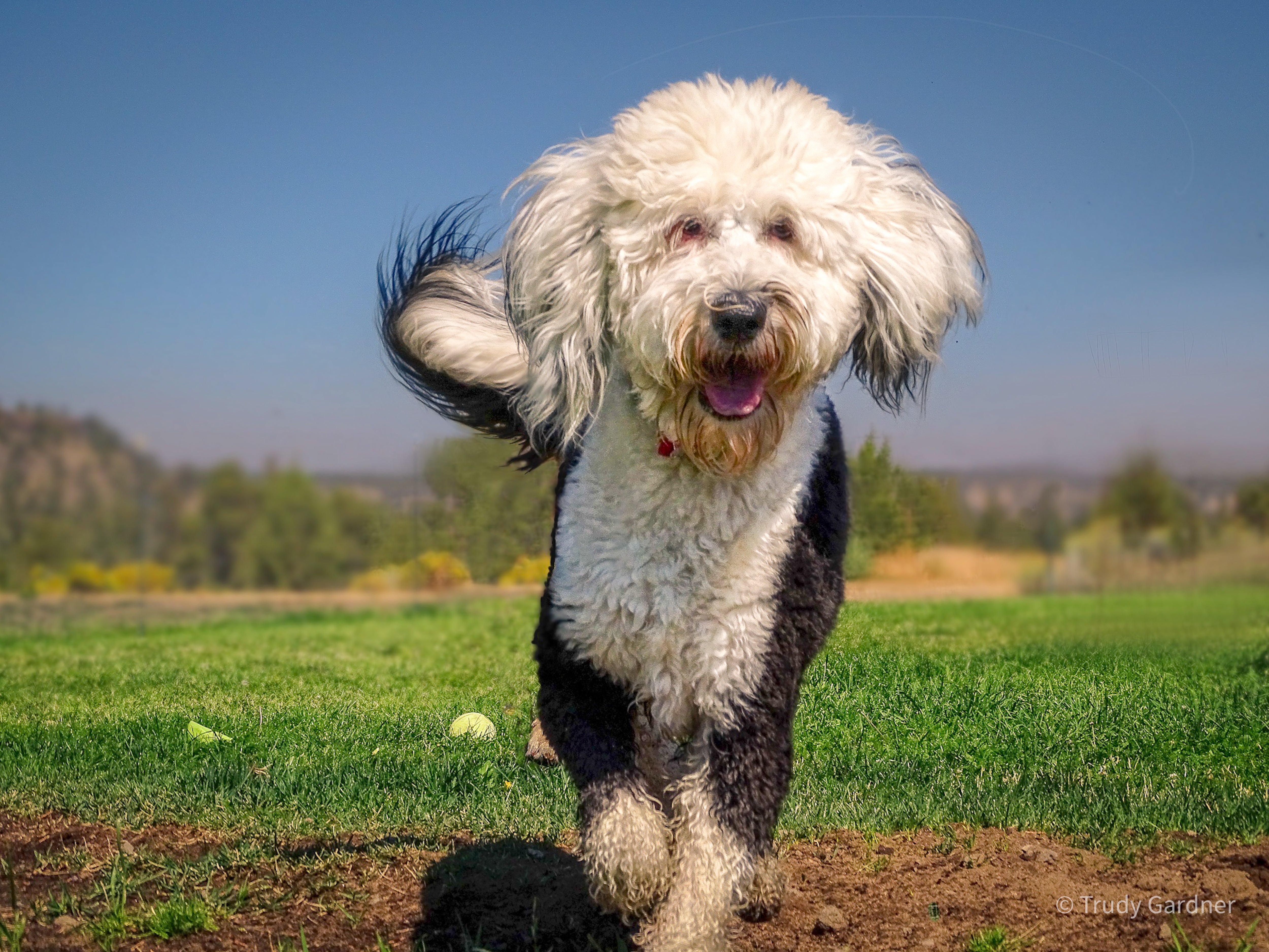Sheepadoodle
The Sheepadoodle is a heart-stealing blend of the Old English Sheepdog's charm and the Standard Poodle's intelligence. With a dash of hypoallergenic magic, they're as captivating as they are cuddly. Renowned for their gentle demeanor and unwavering loyalty, Sheepadoodles are the ultimate companions for any loving family.
Breed characteristics carousel
Learn More
Need to Know
- Dogs suitable for experienced owners
- Extra training required
- Generally healthy breed
- Enjoys active walks
- Minimal drool
- Requires frequent grooming
- Chatty and vocal dog
- Barks and alerts to visitors/anything unusual
- Could have issues with unknown dogs but gets along with known dogs
- Gets along with other pets with training
- May need additional supervision to live with children
- Needs a large yard and can live in suburban and rural areas
- Can be left alone occasionally with training

Personality
Poodles and Old English Sheepdogs are renowned for their playful, outgoing personalities, and the Sheepadoodle combines the best of both worlds into one adorable package. These social butterflies are not just pets—they're devoted family members known for their gentle hearts and unwavering loyalty. With their roots as diligent working dogs, Sheepadoodles thrive on active play and cherished bonding moments with their loved ones. Affectionate, quick to learn, and bursting with energy, they flourish with positive reinforcement training, ensuring they sparkle as bright companions in your home. Keeping them entertained with mental challenges and interactive play keeps their mischievous side at bay, making every day with a Sheepadoodle a delightful adventure!
The Sheepadoodle is a relatively new breed, but its parent breeds have ancient origins. The Old English Sheepdog, originally used for cattle herding rather than sheep, dates back to the mid-1700s in England. These dogs were prized for their strong work ethic, robust physique, and weather-resistant coats, which were even spun into warm clothing by farmers' wives using discarded shearings.
On the other hand, the Poodle is an ancient German water-retrieving dog, with a history dating back centuries. Their distinctive haircuts were designed for functional purposes, enhancing speed and agility in water rather than being merely fashionable. Their streamlined bodies facilitated swift movement through water, while the pom-poms served to protect vital organs.
The exact origins of the Sheepadoodle are unclear, but they likely began to emerge in the 1980s or 1990s. This period saw an increase in crossbreeding with Poodles to impart hypoallergenic traits to more breeds, including the Sheepadoodle.
Old English Sheepdog and Poodle mix breed owners should be aware that the outcome of this crossbreed can vary—some may inherit more traits from the Sheepdog, while others may favor the Poodle. These fluffy black and white companions require regular long walks, extensive training, and plenty of mentally stimulating activities. They thrive in rural or suburban settings with fenced-in yards and generally do well in homes with older children or without young kids.
To keep up with a Sheepadoodle's boundless energy, owners need to match their enthusiasm with plenty of action. Poodles crave exercise and mental challenges, while Old English Sheepdogs live for playful romps outdoors. Plan for one to two hours of daily physical activity, sprinkled with training sessions and backyard playdates. Remember, the best times for their exercise are the cooler moments of the day—think sunrise strolls and twilight adventures—to keep their tails wagging and their hearts happy!
The Sheepadoodle is a large and active dog who needs a good-sized living space. They appreciate large, fenced-in yards with plenty of space to roam and romp.
The Sheepadoodle's coat can be as diverse as their personality! If they take after the Poodle side, shedding is minimal but regular trims are a must to keep them looking dapper. On the other paw, if they lean more towards the Old English Sheepdog, expect some shedding and be prepared for regular grooming sessions to keep their fluffy coat mat-free and fabulous. Whether you trust a professional groomer or take on the challenge yourself, maintaining their coat is key to their charm. And don't forget those adorable ears—Poodles' fluffy ears need extra TLC to keep them infection-free and as fluffy as ever!
Training a Sheepadoodle is all about positive vibes and rewards! Start with teaching them to walk nicely on a leash, respond eagerly when called, and greet guests without bounding all over. Socializing them is like giving them the VIP treatment—they'll strut their stuff confidently around new pals. And let's not forget grooming—show them it's spa day every day, and they'll flaunt their fluffy best like the stars they are!
Sheepadoodles are the ultimate family darlings! With their gentle and friendly nature, they're perfect companions for every member of the household, from kids to other dogs. Their smarts and loving personalities make them super adaptable to any family's unique vibe and lifestyle—making every day a tail-wagging adventure with these cuddly sweethearts by your side.
The cost of a Sheepadoodle from a breeder is significantly more than the cost of adopting one from a local shelter or rescue. The adoption fee usually covers additional items such as spaying or neutering, vaccines, and microchipping.

Learn more about feeding and caring for your Sheepadoodle on Purina.
Did You Know?
- Sheepadoodles are popular as therapy and service dogs due to their friendly temperament, intelligence, and ability to bond closely with their owners. They excel in roles where they provide comfort and assistance to those in need.

